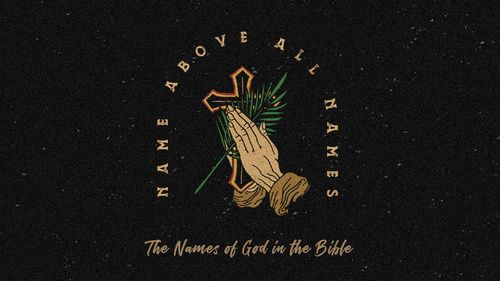The Names of God in the Bible

“In the ancient world generally, a name was not merely a convenient collocation of sounds by which a person, place, or thing could be identified; rather, a name expressed something of the very essence of that which was being named. Hence, to know the name was to know something of the fundamental traits, nature, or destiny of that to which the name belonged.” Karla G. Bohmbach, Eerdmans Dictionary of the Bible, 944
What's in a Name?
Do you know what your name means? Most names have a backstory or a deeper meaning behind them. This is especially true of names in the Bible. which were often shorter phrases that captured that person’s inner character (or what the parents hoped the child would grow up to be). To know a person’s name was to know the person’s true identity.
God has many names in the Bible, but they all point us to the one true God. Studying his names allows us to know him better and relate with him in healthier and more faithful ways. When we stop to consider who God is at his core, it helps us understand the kind if relationship he desires to have with his children.
A study like this can turn into more and more information, but we need to always remind ourselves that the goal of our relationship with Christ is transformation. I am praying that this study helps us understand who God is so we can interact with him the way he always intended.
So let’s dive right into our study of the names of God in the Bible!
God has many names in the Bible, but they all point us to the one true God. Studying his names allows us to know him better and relate with him in healthier and more faithful ways. When we stop to consider who God is at his core, it helps us understand the kind if relationship he desires to have with his children.
A study like this can turn into more and more information, but we need to always remind ourselves that the goal of our relationship with Christ is transformation. I am praying that this study helps us understand who God is so we can interact with him the way he always intended.
So let’s dive right into our study of the names of God in the Bible!
The Three Most Common Names for God:
- Yahweh (YHWH, Jehovah) — 6,500 times. God’s personal name first revealed to Moses in the burning bush. First used in Genesis 2:4 (if that seems out of order, remember that God revealed the name to Moses, who later wrote Genesis. Moses used this personal name for God as he told the story of his ancestors).
- Elohim — 2,000 times. A somewhat generic word for “gods” that was also used by other cultures for their own deities. First used in Genesis 1:1.
- Adonai — About 434 times. A word that means lord, master, or owner. First used in Genesis 15:2.
Other Names of God in the Bible:
On a few occasions, the Bible takes one of God’s three common names (Yahweh, Elohim, or Adonai) and adds an additional description to reveal something new about God. Generally this happens after someone has an extraordinary experience where they discover more about the heart of God and how he loves us.
One example would be Abraham calling God “Jehovah-Jireh” after God intervened to stop him from sacrificing his son Isaac, and instead provided an alternative sacrifice so Isaac could be spared (Genesis 22:12-14). Jehovah-Jireh means The Lord (Yahweh) Provides, which makes perfect sense in the context of the story.
One example would be Abraham calling God “Jehovah-Jireh” after God intervened to stop him from sacrificing his son Isaac, and instead provided an alternative sacrifice so Isaac could be spared (Genesis 22:12-14). Jehovah-Jireh means The Lord (Yahweh) Provides, which makes perfect sense in the context of the story.
Metaphors and Human Imagery:
In addition to names, the Bible uses a wife variety of metaphors and images from everyday life to describe God and the way he interacts with us. Here is a small sample:
Metaphors and analogies are helpful tools to convey information quickly. But when the Bible uses human imagery to describe a God who exists outside of time and space, there are certain limitations. These metaphors tell us something about God, but not everything. And they certainly have their limits. God is a rock, but every rock I’ve encountered just sits there passively and doesn’t have any thoughts or speech. God is a rock, but he’s more than a rock. In that way, human images are a helpful tool to describe God, but they’re far from perfect.
- A shepherd who guides us (Psalm 23:1)
- A king who leads us (Psalm 5:2)
- A warrior who fights for us (Exodus 15:3)
- A father who loves us (Psalm 103:13)
- A mother who nourishes us (Isaiah 66:12-13)
- A rock we can depend on (Deut. 32:4)
- A light to show us the way (Psalm 27:1)
- A refuge to give us sanctuary (Psalm 9:9)
- A shield to protect us from danger (Genesis 15:1)
Metaphors and analogies are helpful tools to convey information quickly. But when the Bible uses human imagery to describe a God who exists outside of time and space, there are certain limitations. These metaphors tell us something about God, but not everything. And they certainly have their limits. God is a rock, but every rock I’ve encountered just sits there passively and doesn’t have any thoughts or speech. God is a rock, but he’s more than a rock. In that way, human images are a helpful tool to describe God, but they’re far from perfect.
